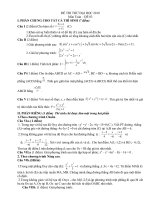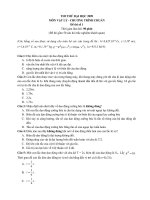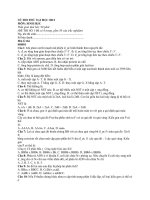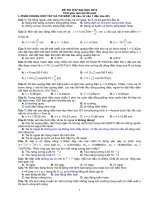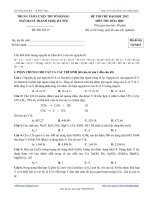Đề thi thử đại học 2008-2009 môn Tiếng Anh
Bạn đang xem bản rút gọn của tài liệu. Xem và tải ngay bản đầy đủ của tài liệu tại đây (142.69 KB, 5 trang )
BỘ GIÁO DỤC VÀ ĐÀO TẠO
ĐỀ CHÍNH THỨC
(Đề thi có 04 trang)
ĐỀ THI TUYỂN SINH ĐẠI HỌC, CAO ĐẲNG NĂM 2009
Môn thi: TIẾNG ANH, Khối D
Thời gian làm bài: 90 phút.
Mã đề thi 840
Họ, tên thí sinh:..........................................................................
Số báo danh:............................................................................
ĐỀ THI GỒM 80 CÂU (TỪ CÂU 1 ĐẾN CÂU 80) DÀNH CHO TẤT CẢ THÍ SINH.
Chọn phương án đúng (A hoặc B, C, D) ứng với câu có nghĩa gần nhất với mỗi câu cho sẵn sau đây.
Câu 1: “Shall I make you a coffee?” the girl said to the lady.
A. The girl promised to make a coffee for the lady. B. The girl refused to make a coffee for the lady.
C. The girl wanted to make a coffee for the lady. D. The girl offered to make a coffee for the lady.
Câu 2: The critics undervalued his new book.
A. The critics rejected his new book. B. The critics turned down his new book.
C. The critics were fed up with his new book. D. The critics had a low opinion of his new book.
Câu 3: No sooner had she put the telephone down than her boss rang back.
A. Scarcely had she put the telephone down when her boss rang back.
B. She had hardly put the telephone down without her boss rang back.
C. Hardly she had hung up, she rang her boss immediately.
D. As soon as her boss rang back, she put down the telephone.
Câu 4: The captain to his men: “Abandon the ship immediately!”
A. The captain ordered his men to abandon the ship immediately.
B. The captain suggested his men abandon the ship immediately.
C. The captain invited his men to abandon the ship immediately.
D. The captain requested his men to abandon the ship immediately.
Câu 5: David drove so fast; it was very dangerous.
A. David drove so fast that was very dangerous. B. David drove so fast, which was very dangerous.
C. David drove so fast, then was very dangerous. D. David drove so fast and was very dangerous.
Chọn phương án (A hoặc B, C, D) ứng với từ có trọng âm chính nhấn vào âm tiết có vị trí khác với ba từ còn
lại
trong mỗi câu.
Câu 6: A. scenery B. location C. festival D. atmosphere
Câu 7: A. geography B. geometry C. opposite D. endanger
Câu 8: A. prevent B. remote C. recent D. receive
Câu 9: A. circumstance B. community C. photographer D. considerate
Câu 10: A. appear B. apply C. anthem D. attend
Đọc kỹ đoạn văn sau và chọn phương án đúng (A hoặc B, C, D) cho mỗi chỗ trống từ 11 đến 20.
Health and fitness are not just for young people. They are for anyone willing to accept the (11)______ for a good
diet
and (12)______ exercise. With age, there is a tendency to feel that the body is no longer able to (13)______.
Aches and
pains are (14)______ normal. Instead of pushing the body to do (15)_______, activities become limited. Yet
examples after
examples have shown us that older people can – and should – be (16)______. Men and women in their sixties
have run in
marathons, races of more than twenty-six miles. Some professional athletes stay (17)______ into their forties and
fifties.
For most people, simple activities like walking and swimming are all that is needed to stay in (18)______. It’s
important to
include exercise in your daily routine. In the winter, (19)______ push-ups, sit-ups, and other indoor exercises. Of
course,
such exercises will be of little use (20)______ you follow them with soda and chips.
Câu 11: A. strictness B. discipline C. regulation D. ruling
Câu 12: A. little B. regular C. useful D. much
Câu 13: A. operate B. perform C. run D. malfunction
Câu 14: A. considered B. made C. believed D. thought
Câu 15: A. weaker B. faster C. greater D. more
Câu 16: A. active B. passive C. eager D. bold
Câu 17: A. equal B. passive C. comparative D. competitive
Câu 18: A. shape B. need C. contact D. form
Câu 19: A. get B. do C. make D. work
Câu 20: A. unless B. although C. if D. otherwise
Đọc kỹ đoạn văn sau và chọn phương án đúng (A hoặc B, C, D) cho mỗi chỗ trống từ 21 đến 30.
The wind controls our planet's weather and climate. But how much do we understand about this complex force
(21)______ can kill and spread fear?
On the night of October 15, 1987, the south of England was (22)_____ by strong winds. Gusts of over 130 km/h
(23)______ through the region. Nineteen people were killed, £1.5-billion worth of damage was (24) ______ and 19
million
trees were blown down in just a few hours.
Trang 2/4 - Mã đề thi 840
Although people thought of this (25)_____ a hurricane, the winds of 1987 were only a (26)______ 7 storm. They
remain
far better known than the much more serious storms of January 25, 1990, (27)______ most of Britain was hit by
daytime
winds of up to 173 km/h. On this occasion, 47 people were killed, even though, (28)______ in 1987, the weather
forecasters issued accurate warnings.
Extreme weather events such as these are dramatic (29)______ of the power of the wind. It is one part of the
weather
that people generally do not give a second (30)______ to, but across the world the wind plays a crucial role in
people's
lives.
Câu 21: A. which B. where C. what D. when
Câu 22: A. besieged B. struck C. beaten D. attacked
Câu 23: A. flew B. spread C. blew D. ran
Câu 24: A. resulted B. created C. caused D. paid
Câu 25: A. same as B. unlike C. as D. like
Câu 26: A. length B. power C. strength D. force
Câu 27: A. why B. until C. when D. while
Câu 28: A. when B. unlike C. like D. such as
Câu 29: A. reminders B. memories C. recalls D. remains
Câu 30: A. help B. care C. thought D. think
Chọn phương án đúng (A, B, C, hoặc D) để hoàn thành mỗi câu sau.
Câu 31: Never before ______ as accelerated as they are now during the technological age.
A. have been historical changes B. historical changes have been
C. historical have changes been D. have historical changes been
Câu 32: Peter asked me ______.
A. what time the film starts B. what time the film started
C. what time does the film start D. what time did the film start
Câu 33: ______, he felt so unhappy and lonely.
A. Rich as was he B. Despite of his wealth C. Rich as he was D. Despite he was so rich
Câu 34: ______ as taste is really a composite sense made up of both taste and smell.
A. To which we refer B. That we refer to it C. What we refer to D. What do we refer to
Câu 35: She will be ill ______.
A. provided she takes a few days’ rest B. if she takes a few days’ rest
C. in case she takes a few days’ rest D. unless she takes a few days’ rest
Chọn phương án đúng (A hoặc B, C, D) để hoàn thành mỗi câu sau.
Câu 36: I just took it ______ that he’d always be available.
A. into consideration B. easy C. into account D. for granted
Câu 37: Ensure there is at least a 3cm space ______ allow adequate ventilation.
A. with a view to B. in view of C. so as to D. so that
Câu 38: My father hasn't had much ______ with my family since he moved to New York.
A. contact B. connection C. meeting D. business
Câu 39: It was announced that neither the passengers nor the driver ______ in the crash.
A. were injured B. are injured C. have been injured D. was injured
Câu 40: Nowadays children would prefer history ______ in more practical ways.
A. to teach B. teach C. be taught D. to be taught
Câu 41: She nearly lost her own life ______ attempting to save the child from drowning.
A. with B. at C. for D. in
Câu 42: While southern California is densely populated, ______ live in the northern part of the state.
A. a number people B. a few of people C. many people D. few people
Câu 43: Prizes are awarded ______ the number of points scored.
A. according to B. adding up C. because of D. resulting in
Câu 44: Why don’t you ask the man where ______ to stay?
A. he would rather B. would he like C. he feels like D. he would like
Câu 45: If she ______ sick, she would have gone out with me to the party.
A. weren’t B. hadn’t been C. wasn’t D. hasn’t been
Câu 46: The building has a smoke detector ______ any fires can be detected immediately.
A. as if B. so that C. if D. such as
Câu 47: I hadn’t realized she was English ______ she spoke.
A. in case B. when C. until D. only after
Câu 48: Anne: “Thanks for the nice gift!”
John: “______”
A. I’m glad you like it. B. You’re welcomed.
C. In fact, I myself don’t like it. D. But do you know how much it costs?
Câu 49: My car is getting unreliable; I think I'll trade it ______ for a new one.
A. off B. up C. in D. away
Câu 50: He was ______ speaker!
A. how good a B. what a good C. so good a D. so a good
Câu 51: The case against the corruption scandal was ______.
A. eliminated B. discarded C. dismissed D. refused
Câu 52: The old houses were ______ down to make way for a block of flats.
A. banged B. knocked C. put D. hit
Câu 53: Anne persisted ______ her search for the truth about what had happened.
A. at B. in C. about D. on
Câu 54: The two countries have reached an agreement through dialogues described as ________.
A. productive B. counterproductive C. unproductive D. productivity
Câu 55: _______ that she burst into tears.
A. She was so anger B. Such her anger was C. So angry she was D. Her anger was such
Đọc kỹ đoạn văn sau và chọn phương án đúng (A hoặc B, C, D) cho mỗi câu từ 56 đến 65.
Millions of people are using cellphones today. In many places, it is actually considered unusual not to use one. In
many
countries, cellphones are very popular with young people. They find that the phones are more than a means of
communication - having a mobile phone shows that they are cool and connected.
The explosion in mobile phone use around the world has made some health professionals worried. Some doctors
are
concerned that in the future many people may suffer health problems from the use of mobile phones. In England,
there has
been a serious debate about this issue. Mobile phone companies are worried about the negative publicity of
such ideas.
They say that there is no proof that mobile phones are bad for your health.
On the other hand, medical studies have shown changes in the brain cells of some people who use mobile
phones.
Signs of change in the tissues of the brain and head can be detected with modern scanning equipment. In one
case, a
traveling salesman had to retire at young age because of serious memory loss. He couldn't remember even simple
tasks.
He would often forget the name of his own son. This man used to talk on his mobile phone for about six hours a
day, every
day of his working week, for a couple of years. His family doctor blamed his mobile phone use, but his employer's
doctor
didn't agree.
What is it that makes mobile phones potentially harmful? The answer is radiation. High-tech machines can detect
very
small amounts of radiation from mobile phones. Mobile phone companies agree that there is some radiation, but
they say
the amount is too small to worry about.
As the discussion about their safety continues, it appears that it's best to use mobile phones less often. Use your
regular phone if you want to talk for a long time. Use your mobile phone only when you really need it. Mobile
phones can
be very useful and convenient, especially in emergencies. In the future, mobile phones may have a warning label
that says
they are bad for your health. So for now, it's wise not to use your mobile phone too often.
Câu 56: According to the passage, cellphones are especially popular with young people because ______.
A. they keep the users alert all the time B. they are indispensable in everyday communications
C. they cannot be replaced by regular phones D. they make them look more stylish
Câu 57: The changes possibly caused by the cellphones are mainly concerned with ______.
A. the smallest units of the brain B. the mobility of the mind and the body
C. the resident memory D. the arteries of the brain
Câu 58: The word "means" in the passage most closely means ______.
A. “expression” B. “method” C. “meanings” D. “transmission”
Câu 59: The word "potentially" in the passage most closely means ______.
A. “privately” B. “possibly” C. “certainly” D. “obviously”
Câu 60: "Negative publicity" in the passage most likely means ______.
A. widespread opinion about bad effects of cellphones B. the negative public use of cellphones
C. information on the lethal effects of cellphones D. poor ideas about the effects of cellphones
Câu 61: Doctors have tentatively concluded that cellphones may ________.
A. change their users’ social behaviours B. change their users’ temperament
C. cause some mental malfunction D. damage their users’ emotions
Câu 62: The man mentioned in the passage, who used his cellphone too often, ______.
A. suffered serious loss of mental ability B. had a problem with memory
C. abandoned his family D. could no longer think lucidly
Câu 63: According to the passage, what makes mobile phones potentially harmful is ______.
A. their radiant light B. their invisible rays
C. their raiding power D. their power of attraction
Câu 64: According to the writer, people should ______.
A. never use mobile phones in all cases B. only use mobile phones in medical emergencies
C. keep off mobile phones regularly D. only use mobile phones in urgent cases
Câu 65: The most suitable title for the passage could be ______.
A. “Mobile Phones: A Must of Our Time” B. “The Way Mobile Phones Work”
C. “Technological Innovations and Their Price” D. “The Reasons Why Mobile Phones Are Popular”
Chọn phương án (A hoặc B, C, D) ứng với từ/cụm từ có gạch chân cần phải sửa để các câu sau trở thành
câu
đúng.
Câu 66: We admire Lucy for her intelligence, cheerful disposition and she is honest.
A B C D
Câu 67: In my opinion, I think this book is more interesting than the other one.
A B C D
Câu 68: However small, the sitting room is well designed and nicely decorated.
A B C D
Câu 69: Many successful film directions are former actors who desire to expand their experience in the film
industry.
A B C D
Câu 70: Educated in the UK, his qualifications are widely recognized in the world of professionals.
A B C D
Trang 4/4 - Mã đề thi 840
Đọc kỹ đoạn văn sau và chọn phương án đúng (A hoặc B, C, D) cho mỗi câu từ 71 đến 80.
Traditionally in America, helping the poor was a matter for private charities or local governments. Arriving
immigrants
depended mainly on predecessors from their homeland to help them start a new life. In the late 19th and early
20th
centuries, several European nations instituted public-welfare programs. But such a movement was slow to take
hold in the
United States because the rapid pace of industrialization and the ready availability of farmland seemed to confirm
the belief
that anyone who was willing to work could find a job.
Most of the programs started during the Depression era were temporary relief measures, but one of the programs
-
Social Security - has become an American institution. Paid for by deductions from the paychecks of working
people, Social
Security ensures that retired persons receive a modest monthly income and also provides unemployment
insurance,
disability insurance, and other assistance to those who need it. Social Security payments to retired persons can
start at age
62, but many wait until age 65, when the payments are slightly higher. Recently, there has been concern that the
Social
Security fund may not have enough money to fulfill its obligations in the 21st century, when the population of
elderly
Americans is expected to increase dramatically. Policy makers have proposed various ways to make up the
anticipated
deficit, but a long-term solution is still being debated.
In the years since Roosevelt, other American presidents have established assistance programs. These include
Medicaid and Medicare; food stamps, certificates that people can use to purchase food; and public housing which
is built at
federal expense and made available to persons on low incomes.
Needy Americans can also turn to sources other than the government for help. A broad spectrum of private
charities
and voluntary organizations is available. Volunteerism is on the rise in the United States, especially among retired
persons.
It is estimated that almost 50 percent of Americans over age 18 do volunteer work, and nearly 75 percent of U.S.
households contribute money to charity.
Câu 71: New immigrants to the U.S. could seek help from ______.
A. volunteer organizations B. the US government agencies
C. only charity organizations D. the people who came earlier
Câu 72: It took welfare programs a long time to gain a foothold in the U.S. due to the fast growth of______.
A. urbanization B. industrialization C. population D. modernization
Câu 73: The word “instituted” in the first paragraph mostly means ______.
A. “studied” B. “enforced” C. “introduced” D. “executed”
Câu 74: The Social Security program has become possible thanks to ______.
A. enforcement laws B. people’s willingness to work
C. deductions from wages D. donations from companies
Câu 75: Most of the public assistance programs ______ after the severe economic crisis.
A. did not become institutionalized B. functioned fruitfully in institutions
C. did not work in institutions D. were introduced into institutions
Câu 76: That Social Security payments will be a burden comes from the concern that ______.
A. younger people do not want to work B. the program discourages working people
C. elderly people ask for more money D. the number of elderly people is growing
Câu 77: Persons on low incomes can access public housing through ______.
A. federal expenditure B. state spending C. donations D. low rents
Câu 78: Americans on low incomes can seek help from ______.
A. federal government B. state governments
C. government agencies D. non-government agencies
Câu 79: Public assistance has become more and more popular due to the ______.
A. people’s growing commitment to charity B. innovations in the tax system
C. volunteer organizations D. young people’s voluntarism only
Câu 80: The passage mainly discusses ______.
A. public assistance in America B. immigration into America
C. ways of fund-raising in America D. funding agencies in America

